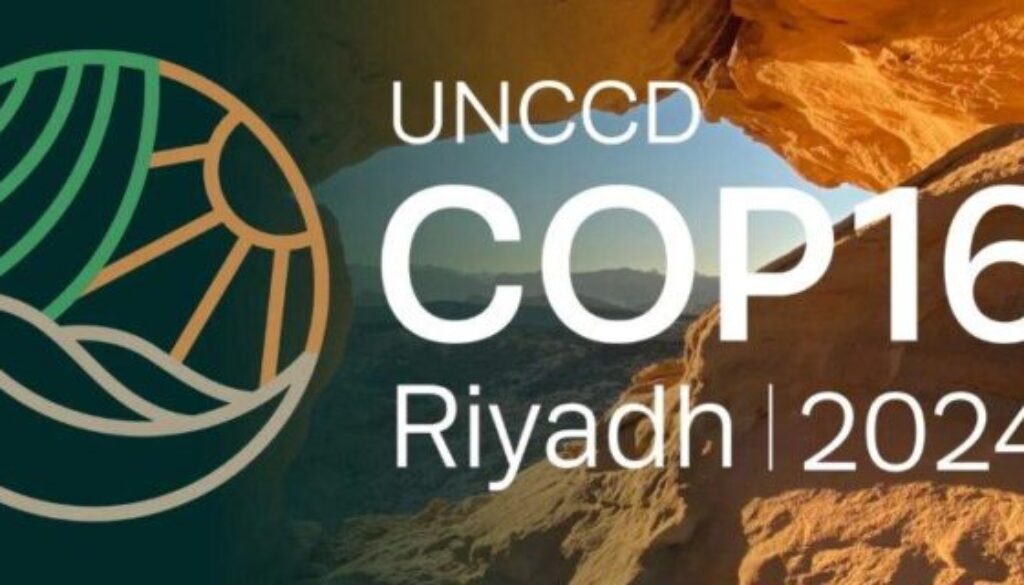BY DR SOHA MAAD
Introduction
The 16th Conference of the Parties (COP 16) took place in Riyadh in Saudi Arabia, from 2 to 13 December 2024. The event was part of the United Nations Convention to Combat Desertification (UNCCD) and aimed to address global challenges like land degradation, drought, and desertification. COP 16 was notable for being the largest meeting in the history of the UNCCD and the first to be held in the Middle East. The conference brought together representatives from 197 countries to collaborate on solutions for rehabilitating degraded land and building resilience against drought.
COP 16 was a game-changer, marking a renewed global commitment to accelerate investment and action to restore land and boost drought resilience.
This article overviews COP 16. The overview covers the agenda, key participants, the water focus, challenges faced, the impact, climate diplomacy at COP 16, and the technology focus. The article concludes with COPS future outlook. The future of COPs holds promise for driving meaningful and transformative action on climate change. With continued ambition, collaboration, and innovation, these conferences will play a crucial role in shaping a sustainable and resilient future.
Cop 16 at a Glance
COP 16 key topics included sustainable land management, artificial intelligence, and the social and economic impacts of land degradation. It was an important and crucial event for global environmental efforts. The agenda for COP 16 in Riyadh was quite comprehensive and innovative. Key activities included:
Negotiation Track
This included ministerial dialogues that involved discussions on drought resilience, finance, and migration. It also included critical decisions that focused on advancing global land and drought resilience through political declarations.
Action Agenda
This included thematic days. Each day focused on a specific theme to drive action and collaboration as follows:
- Land day: to address the role of healthy land in combating climate change, creating jobs, and reducing poverty.
- Agri-food system day: for promoting sustainable farming for resilient crops and ecosystem protection.
- Governance day: for inclusive land governance.
- People’s day: to address the role of youth, women, and civil society in decision-making.
- Science, Technology, and Innovation Day: for exploring innovative solutions for land health.
- Resilience day: to formulate policies and approaches for climate resilience.
- Finance day: for funding innovations for land and drought resilience.
Additional Events
There were also additional events including:
- Saudi Green Initiative Forum: Running alongside COP 16, focusing on global climate challenges under the theme “Action is in Our Nature”.
- Green Zone: Engaging scientists, businesses, Non-Government Organizations NGOs, and the public in collaborative efforts.
Cop 16 Key Participants
COP 16 in Riyadh attracted a diverse array of key participants, including:
- Government Representatives: from 196 Countries and the European Union.
- United Nations Officials
- Private Sector Leaders: including businesses and financial Institutions engaging in collaborative projects and innovative solutions for land restoration and drought resilience
- NGOs and Civil Society
- Experts and Academics
- Host Country Representatives from Saudi Arabian Officials
These participants worked together to drive global action and collaboration towards sustainable land management and drought resilience.
The Water Focus at Cop 16
Water scarcity was a significant focus at COP 16 in Riyadh. The conference highlighted the critical role of water in combating desertification and land degradation. Key points addressed in the water focus included:
Key Themes and Initiatives
- Water Scarcity and Desertification: Addressing the link between water scarcity and land degradation, emphasizing the need for sustainable water management practices.
- Private Sector Involvement: Exploring the role of the private sector in innovative programs focused on water and food security. This includes partnerships between businesses, governments, and NGOs to implement best practices and collaborative solutions.
- National Water Strategy: Saudi Arabia’s National Water Strategy aims to preserve water resources and promote sustainability through recycling projects and other initiatives.
Side Events and Discussions
- Addressing Water Scarcity in the Arab World: A side event focusing on the role of the private sector in combating desertification through innovative water management programs.
- Ministerial Dialogues: Discussions on drought resilience and the importance of water in achieving land degradation neutrality targets.
The conference aimed to foster international collaboration and innovative solutions to tackle water scarcity and enhance drought resilience. It was a crucial step towards ensuring sustainable land and water management for future generations.
Cop 16 Challenges
COP 16 in Riyadh faced several challenges as it aims to address global land degradation, desertification, and drought. Key challenges include:
- Global Coordination and Cooperation
Bringing together 197 parties, including 196 countries and the European Union, requires significant coordination and cooperation to ensure that all parties are aligned and committed to the goals of the conference.
- Funding and Investment
Securing adequate funding and investment for land restoration and drought resilience initiatives is a major hurdle. Mobilizing financial resources from both public and private sectors is essential for implementing effective solutions.
- Implementation of Agreements
Translating agreements and commitments made at COP 16 into actionable and measurable steps is crucial. Ensuring that countries follow through on their pledges and implement sustainable practices on the ground is a significant challenge.
- Addressing Water Scarcity
Water scarcity is a critical issue that intersects with land degradation and desertification. Developing and implementing innovative water management solutions to address this challenge is essential for achieving the conference’s goals.
- Engaging Stakeholders
Involving a wide range of stakeholders, including governments, businesses, NGOs, and local communities, is necessary for comprehensive and effective solutions. Ensuring that all voices are heard and that there is broad-based support for initiatives is a complex task.
- Climate Change Impacts
The impacts of climate change exacerbate land degradation, desertification, and drought. Addressing these interconnected issues requires integrated approaches that consider the broader context of climate change.
- Monitoring and Evaluation
Establishing robust monitoring and evaluation mechanisms to track progress and assess the effectiveness of implemented measures is essential. This helps in making informed decisions and adjusting strategies as needed.
Despite these challenges, COP 16 represented a significant opportunity to drive global action and collaboration towards sustainable land management and drought resilience.
Cop 16 Impact
COP 16 in Riyadh made a significant impact on global efforts to combat desertification, land degradation, and drought. Key impacts include:
- Renewed Global Commitment: The conference aimed to renew global commitment to land restoration and drought resilience. By bringing together representatives from 197 countries, it fostered international collaboration and set ambitious goals for environmental sustainability.
- Innovative Solutions: COP 16 emphasized innovative solutions, including the use of artificial intelligence and sustainable land management practices. These solutions can drive practical and implementable actions to address urgent global crises.
- Private Sector Engagement: The conference highlighted the role of the private sector in environmental efforts. Engaging businesses, financial institutions, and NGOs in collaborative projects is crucial for achieving sustainable land management and combating desertification.
- Policy and Governance: High-level ministerial sessions and thematic days focused on critical issues such as drought resilience, financing, and governance. These discussions produced actionable policies and strengthened governance frameworks for land restoration.
- Social and Economic Benefits: Restoring degraded land and building resilience against drought had significant social and economic benefits. This includes creating jobs, reducing poverty, and improving food security, which are essential for sustainable development.
- Regional Impact: As the first UNCCD COP held in the Middle East and North Africa region, COP 16 brought attention to the unique challenges faced by this region. It addressed these challenges through regional cooperation and tailored solutions.
Climate Diplomacy at Cop 16
Climate diplomacy at COP 16 in Riyadh played a crucial role in addressing global environmental challenges in various respects as follows:
Multilateral Collaboration: COP 16 fostered international cooperation to combat desertification, land degradation, and drought. This multilateral approach is essential for achieving global environmental goals.
High-Level Ministerial Dialogues: The conference featured high-level ministerial dialogues on critical issues such as drought resilience, finance, and migration. These dialogues aimed to produce actionable policies and strengthen governance frameworks for land restoration.
Action-Oriented Agenda: COP 16 introduced a dual-track approach, combining formal negotiations with an action-oriented agenda.
Private Sector Engagement: Engaging the private sector was a key component of climate diplomacy at COP 16. Businesses and financial institutions collaborated on innovative projects enhancing land and drought resilience.
Regional Focus: As the first UNCCD COP held in the Middle East and North Africa region, COP 16 highlights the unique challenges faced by this region.
Funding and Investment
Securing adequate funding and investment for land restoration and drought resilience initiatives was a major focus of climate diplomacy at COP 16.
Geopolitics of Cops 16 Riyadh
The geopolitics of COP 16 in Riyadh are quite significant, given its location and the global attention it has gathered. Key geopolitics involved included:
Regional Significance: COP 16 was the first UNCCD conference held in the Middle East and North Africa (MENA) region.
Saudi Arabia’s Role: As the host country, Saudi Arabia positioned itself as a leader in environmental sustainability and climate action. The conference provided an opportunity for Saudi Arabia to showcase its initiatives, such as the Saudi Green Initiative (SGI) and the Riyadh Global Drought Resilience Initiative.
Global Collaboration: The conference brought together representatives from 197 countries, fostering international cooperation to address global environmental challenges. This multilateral approach is crucial for achieving sustainable land management and drought resilience.
High-Profile Participation: COP 16 features high-profile participants, including heads of state, ministers, and leaders from international organizations.
Economic and Political Implications: The outcomes of COP 16 made significant economic and political implications, particularly for countries in the MENA region.
Innovation and Technology: The conference emphasized the role of innovation and technology in addressing environmental challenges. This included the use of artificial intelligence, sustainable land management practices, and other innovative solutions to enhance land and drought resilience.
COP 16 in Riyadh was a pivotal event that highlighted the geopolitical importance of addressing environmental issues in the MENA region and beyond.
Technology Focus at Cop 16
Technology was a major focus at COP 16 in Riyadh, with several innovative approaches being highlighted to address land degradation, desertification, and drought. Key technological focuses included:
- Remote Sensing and Drones: These tools enable precise monitoring of land health, providing actionable data for targeted restoration efforts and resource optimization.
- Artificial Intelligence (AI): AI is being leveraged to analyze large datasets, predict environmental changes, and develop solutions for sustainable land management.
- Carbon Capture and Hydrogen Production: Saudi Arabia is focusing on technologies such as carbon capture and hydrogen production as part of its circular carbon economy initiative. These efforts aim to balance climate tech investment with the country’s oil interests. The Science, Technology, and Innovation Day at COP 16 presented innovative solutions for land health and resilience, showcasing cutting-edge technologies and scientific advancements.
- Sustainable Farming Technologies: Promoting sustainable farming practices for resilient crops and ecosystem protection was another key focus, with an emphasis on technology-driven solutions.
These technological initiatives have the potential to drive significant progress in combating desertification and enhancing drought resilience.
Cops Future Outlook
The future outlook of the UNCCD (United Nations Convention to Combat Desertification) after COP 16 in Riyadh is promising and ambitious in various respects along these directions:
- Accelerating global efforts to restore degraded land by 2030
- Enhancing drought resilience
- Contributing to Sustainable Development Goals (SDGs)
- Stressing Innovation and Technology role: Technology will play a crucial role in future UNCCD initiatives. Leveraging advancements in remote sensing, artificial intelligence, and sustainable farming practices will drive progress in combating desertification and land degradation.
- Global Collaboration
- People-Centered Approach: This involves engaging local communities, indigenous peoples, and youth in decision-making processes and ensuring that their needs and perspectives are considered.
The future outlook of the UNCCD after COP 16 will entail renewed commitment, innovation, and collaboration to address pressing environmental issues and promote sustainable land management.
In the context of environmental and climate change policies, COP is likely to be shaped by several key trends and priorities including:
- Increased Ambition and Commitments: Future COPs will likely see countries setting more ambitious targets for reducing greenhouse gas emissions, enhancing climate resilience, and promoting sustainable development.
- Focus on Implementation and Accountability: There will be a stronger emphasis on the implementation of commitments made at previous COPs.
- Climate Finance: This involves increasing funding for mitigation and adaptation efforts, especially for developing countries. Innovative financial instruments and private sector engagement will play a key role in closing the climate finance gap.
- Technology and Innovation: Future COPs will continue to highlight the importance of technology and innovation in addressing climate change. This includes the development and deployment of clean energy technologies, sustainable land management practices, and climate-smart agriculture.
- Inclusive and Equitable Solutions: Ensuring that climate policies and actions are inclusive and equitable will be a priority.
- Nature-Based Solutions: There will be a growing focus on nature-based solutions, such as reforestation, ecosystem restoration, and biodiversity conservation, as effective strategies for mitigating climate change and enhancing resilience.
- Addressing Emerging Issues: New and emerging issues, such as climate-induced migration, loss and damage, and the intersection of climate change with health and security, will gain greater attention and require innovative solutions.



